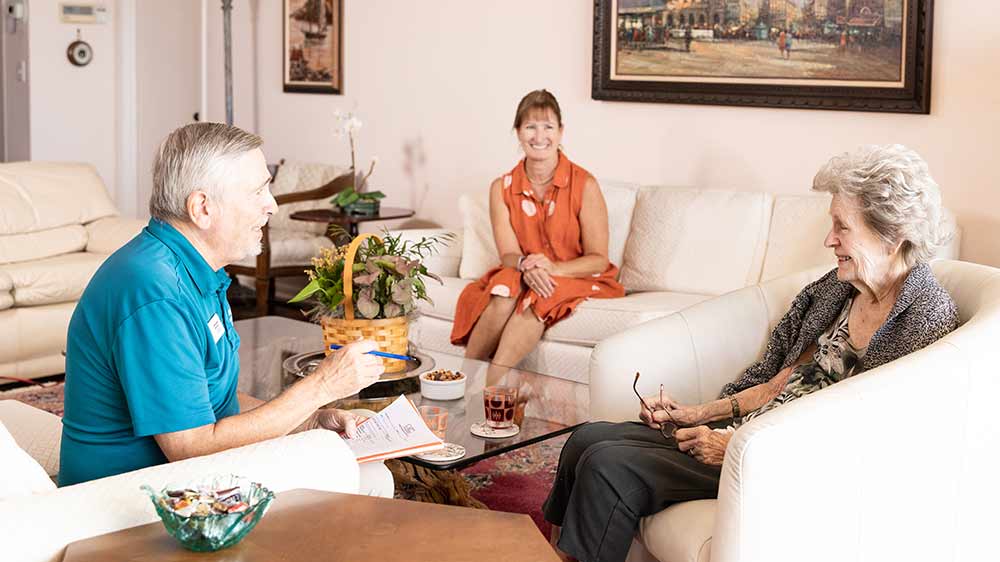

Education, Support, and Communication Key to Filling Family Caregiver Role
The road to being a family caregiver can happen quite gradually or suddenly. One may begin helping here or there with things like prescriptions, appointments, and household tasks that a spouse or parent used to handle independently. Over time, caregiving duties increase. In the case of a crisis, a stroke, fall, or surgery leaves a loved one incapacitated. Going from zero to a hundred can be quite a shock. No matter how or why one ends up in the role of family caregiver, the responsibility is multifaceted, even overwhelming. It may become harder yet without a support system in place.
Most Feel Unprepared To Be a Family Caregiver
Unless the caregiver has medical or health care training, chances are they feel unprepared for various aspects of the job. Most often, the time needed to help must fit in with one’s other life and work commitments. On top of that, it’s almost certainly unpaid. Being responsible for anyone’s well-being entails physical, mental, and emotional stress. In certain situations, it can also stir up deep, even harsh feelings and memories.
As the condition of the individual receiving care changes, new challenges and uncertainty can drain emotions, time, and resources. The family caregiver can feel unappreciated, overworked, and struck from all sides with no clear relief in sight.
Caregiver Self-Care Is Vital
The good news is that resources do exist to help guide family caregivers in navigating this taxing journey. The most important thing to remember, experts say, is that the person receiving care can only do as well as the caregiver cares for themself. Family caregiver self-care is nonnegotiable if there is any realistic expectation of remaining healthy and whole through the experience, which may be better thought of as a process. Just like the grieving process with its different stages, caregiving proceeds in stages—the toughest at the start. Experts advise to begin with:
- Learning the basic caregiving skills and information the situation demands, such as getting up to speed on prescription medications, changing dressings, transferring your older loved one in and out of bed, insurance, financials, and obtaining power of attorney.
- Identifying healthy caregiving coping techniques that emphasize eating right, avoiding alcohol and drugs, exercising, and getting enough sleep.
Education, Expectations, and Resources for Family Caregivers
A host of caregiver books, podcasts, and websites offer answers and strategies for dealing with the caregiving role. Some of this content can be specific to certain situations, such as caring for a dementia patient and what all that entails.
Much of the advice is provided by caregivers themselves. If nothing else, real-life lessons and examples help caregivers know they’re neither alone nor the first to confront these challenges. Caregiver support groups meet in person or virtually. Check online or with local hospitals or medical centers for details about any groups you can attend in your area or ones that you can join remotely.
Expectations play a big role in the caregiving mosaic. The more a caregiver knows about their loved one’s medical diagnosis and prognosis, the better informed and prepared they can be to address what’s happening now and what may transpire in the future. Family caregivers must establish a good working relationship with their loved one’s care team, including physicians, nurses, and pharmacists, to understand what they need to know and do as things crop up.
Most importantly, don’t expect perfection. You’re going to make mistakes. It’s inevitable. You’re human. Therefore, set realistic expectations for yourself as well as for the older adult you care for. Learn to say no to requests that are too big.
Experts say caregivers need to be honest with themselves and others about their feelings. These may include harsh emotions such as anger, resentment, and fear. It is better to express these rather than suppress them and only have them spill out inappropriately at another time.
Caregivers are also advised to make clear their limitations on the extent of care they’re willing or able to provide. Some things may be too physically or emotionally taxing to handle or may require more time and energy than can be afforded. The last thing the caregiver wants to do is to take away from whatever else they care about, such as family or a career, and thus feel cheated and regretful.
Other resource tips from experts include the following:
- Ask for help. It shows strength, not weakness.
- Schedule respite care that offers relief by the hour, day, or week. That relief can be from another family member or a professional caregiver. Getting away from caregiving from time to time so you can recharge is highly recommended.
- Respite care options can also include adult daytime programs in the area. Ask your local area agency on aging or other social service and human service nonprofits about any available caregiver resources that can help, such as transportation, home-delivered meals, day care programs, home repairs, and other services.
- If the care recipient is a military veteran, then home- and community-based services may be available, or benefits may be available to cover or defray the expense of certain services.
Embracing the Role of Family Caregiver
It’s important to remember that not everyone’s cut out for caregiving, and that’s OK. Those who take it on soon learn it should never be taken for granted or diminished. Serving others is hard work and often goes unrewarded. But it is something to be embraced. Experts say that regardless of what one’s duties entail, don’t play the martyr or hero by keeping it all to yourself. Accept that you can’t do it alone and ask for help from others. Humility makes the best caregivers and gives the people in their care the optimal experience.
How Right at Home Can Help
For over 25 years, Right at Home has been helping families navigate the aging journey. Our caregivers provide services ranging from homemaking and companionship to personal care and assistance with chronic conditions such as diabetes and dementia. Our offices can provide services for just a few hours a couple of days a week up to around-the-clock care. This can be a source of respite for family caregivers to recharge their batteries and ensure their own well-being.
For more information, use our office locator to find the nearest office and ask for a FREE in-home consultation.
To receive ongoing caregiving tips, information, and advice, subscribe to our monthly Caring Right at Home e-newsletter today.







